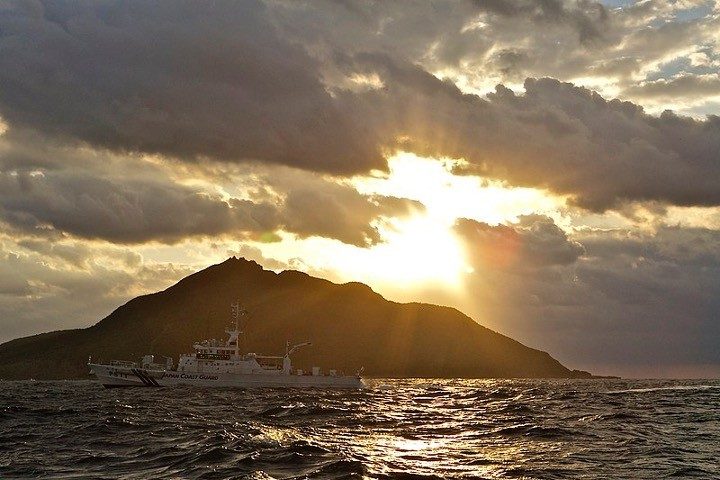
Japan’s Prime Minister Fumio Kishida says his country urgently needs to strengthen its military capabilities against a worsening security environment in the East and South China seas from China and the threat of North Korea’s nuclear and missile advancement.
At an international naval fleet review in Tokyo Bay last week, Kishida shared that he would prepare Japan to face aggression. “We must prepare ourselves for an era when actors emerge to disobey rules and use force or threats to destroy the peace and safety of other nations,” Kishida said, adding, “We will accelerate realistic discussions on what’s needed to defend our people by keeping all options on the table.”
Sounds great, but Japan’s Constitution — which was drafted by Americans when they occupied the nation after 1945 — renounces war and use of force as means of settling international disputes, and bars the country from maintaining a military force. However, Japan does have a small but well-equipped military, called the Self Defense Forces (SDF), to defend the nation in case of attack. The SDF troops are used for critical functions in search-and-rescue operations after natural disasters and earthquakes that strike the country.
Even with the SDF, though, Japan is vulnerable and would need support from the United States military if attacked, under the U.S.-Japan Security Treaty of 1960. That agreement has been the cornerstone of peace, stability, and freedom in the Indo-Pacific region for decades — until recently, with China’s Chairman Xi Jinping desiring to control the region.
News.com.au reported:
In 2016, Xi declared it was a “heavy historical responsibility” for his generation to secure the Japanese-administered Senkaku Islands and dominate the East China Sea. But some in Beijing also have eyes on the entire Ryukyu Island chain — including heavily populated Okinawa.
This would give Beijing guaranteed access to the Pacific Ocean and a buffer against retaliatory action from the United States.
Prior to the annual multilateral Malabar naval exercise last week, a Chinese survey ship crossed through Japanese sovereign waters while warships from the U.S., Japan, India, and Australia were in the area. Beijing reportedly has had nuclear submarines in Japanese waters, as well as combat aircraft regularly circling the home islands. Plus, Chinese Coast Guard ships patrol the sea around the Japanese-controlled Senkaku Islands, an uninhabited island chain also claimed by China and Taiwan.
Due to these incursions by China, “90 per cent of the Japanese population say their government must prepare for a Chinese attack on Taiwan. Some 40 per cent want the constitution amended to boost Japan’s ability to respond.”
The Senkaku Islands, which are known in China as the Diaoyu Islands and in Taiwan as Diaoyutai, have become one of the focal points of increasing tensions in the region. A local Japanese fisherman described for CNN one of several encounters with the Chinese Coast Guard over the past few years: “The bow of one of their ships was pointed straight at us, and they were chasing us. I don’t know for sure, but I also saw what looked like cannons.”
Last Tuesday, “Chairman Xi visited the Central Military Commission in Beijing to tell his forces to ‘prepare for war’ and ‘fight and win,’” News.com.au reported, adding that “Xi instructed his generals to ‘resolutely safeguard’ national sovereignty, security, and development interests. He said he expected them to be successful in those tasks ‘entrusted by the party and the people.'”
Xi made his intentions clear at the October gathering of China’s 20th National Congress: “We will strengthen the normal and diversified use of military forces, carry out military struggles with determination and flexibility, shape the security posture, contain crises and conflicts, and win local wars.”
As Japan prepares to defend itself from the increased threats, The Japan Times reported, it “is considering buying U.S.-developed Tomahawk cruise missiles as part of efforts to more quickly bolster its deterrence capacity,” and is “seeking the ability to disable an enemy country’s missiles in its territory.”
“The national security environment surrounding our nation is growing more severe, including the East China Sea and South China Sea,” Prime Minister Kishida said earlier this week. “The enhancement of our naval capabilities cannot wait, including the construction of new naval ships, bolstering our missile defence capacity and improvement of the work conditions and compensations for our personnel,” News.com.au reported.
While Japan prepares to defend itself from any potential conflict, President “Biden assured Asian leaders that U.S. competition with China would not ‘veer into conflict’ Sunday as Japan accused Chinese leader Xi Jinping of infringing on its sovereignty.”
President Biden met with Japanese Prime Minister Kishida Fumio in Phnom Penh, Cambodia, on Sunday, and the White House reported that Biden reinforced the United States’ commitment to the defense of Japan.
Regarding Taiwan, President Biden met with Xi in Bali, Indonesia, on Monday, and spoke candidly with Xi about “their respective priorities and intentions across a range of issues.” He reiterated that
our one China policy has not changed, the United States opposes any unilateral changes to the status quo by either side, and the world has an interest in the maintenance of peace and stability in the Taiwan Strait. He raised U.S. objections to the PRC’s coercive and increasingly aggressive actions toward Taiwan, which undermine peace and stability across the Taiwan Strait and in the broader region, and jeopardize global prosperity.
We can only hope that Japan will remain vigilant in her defense and that China will ease from its aggressive pursuit of reclaiming Taiwan.




